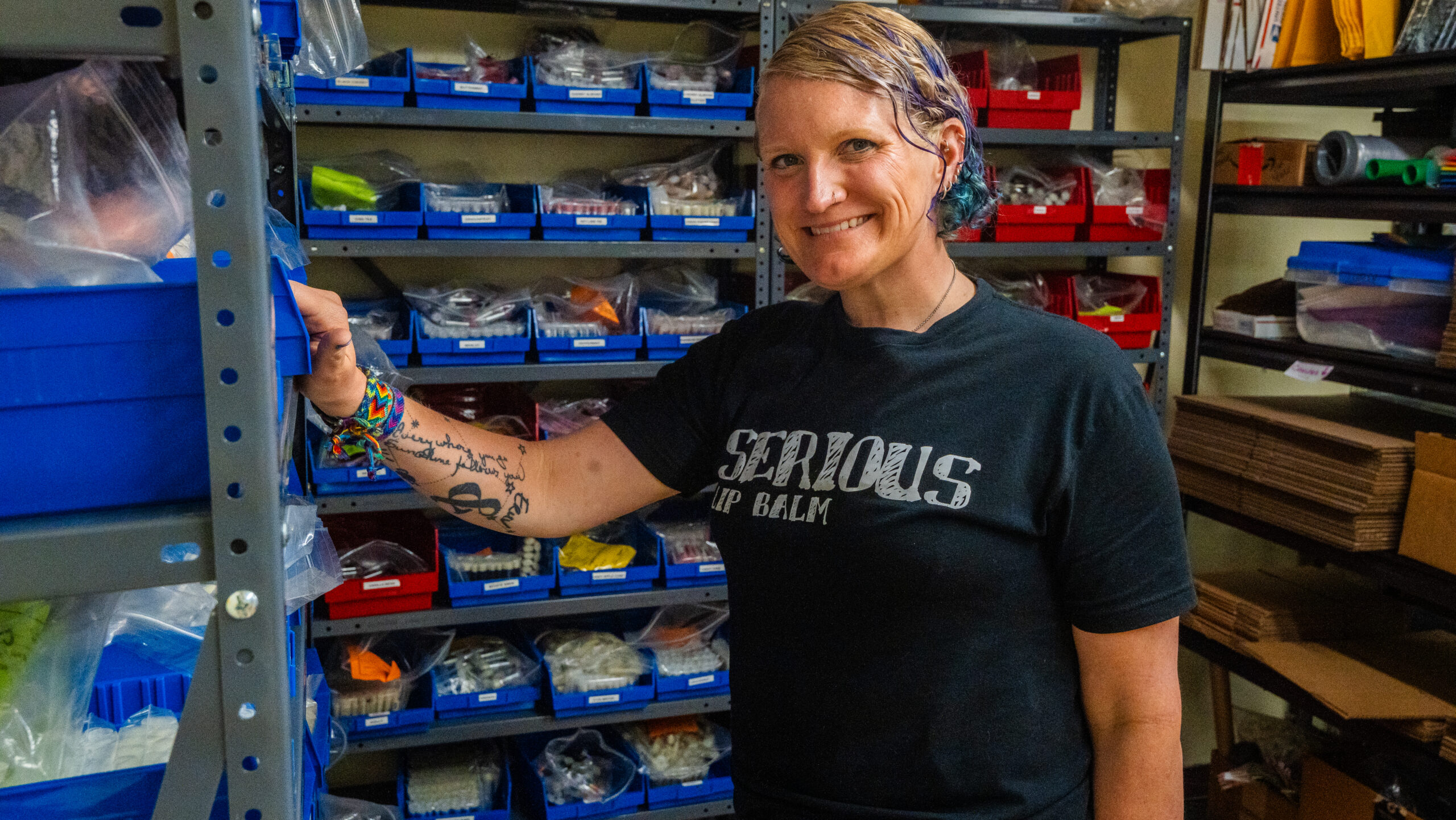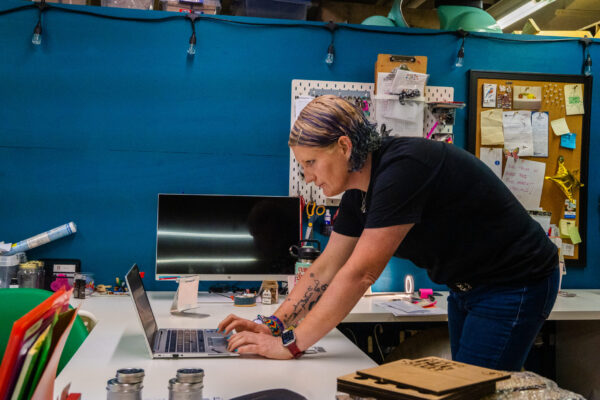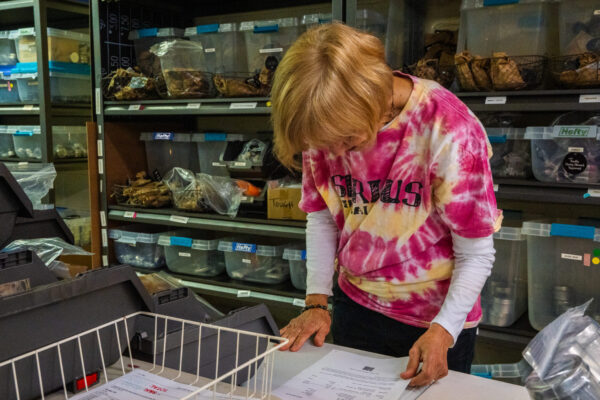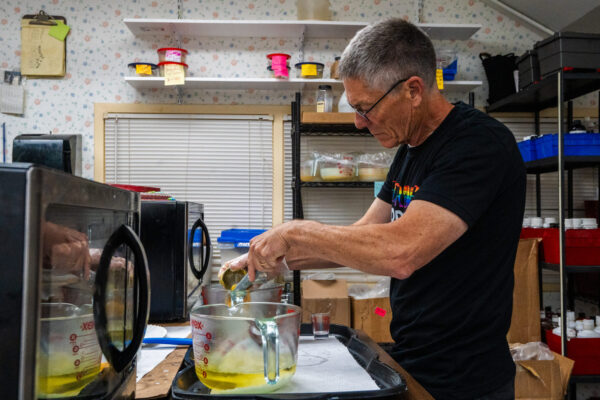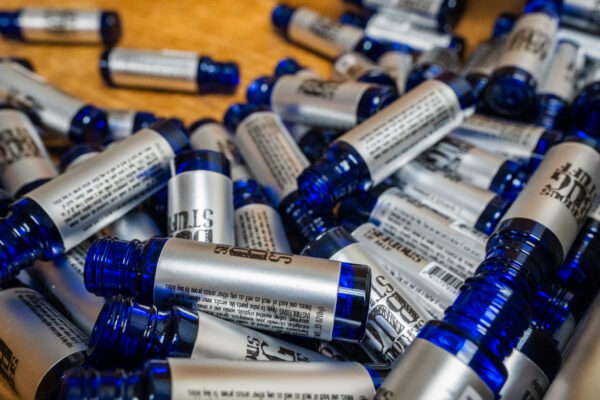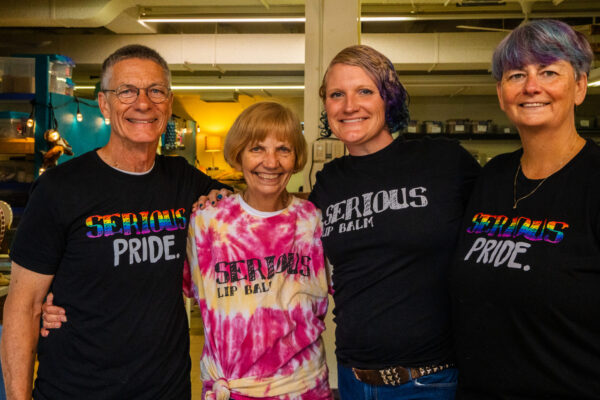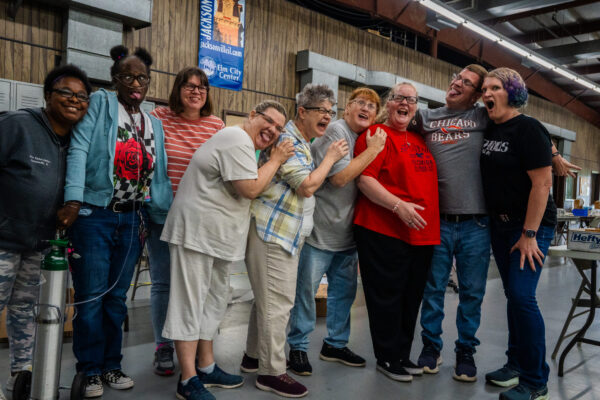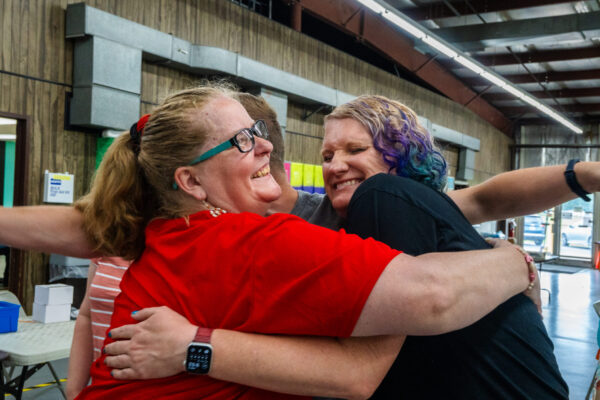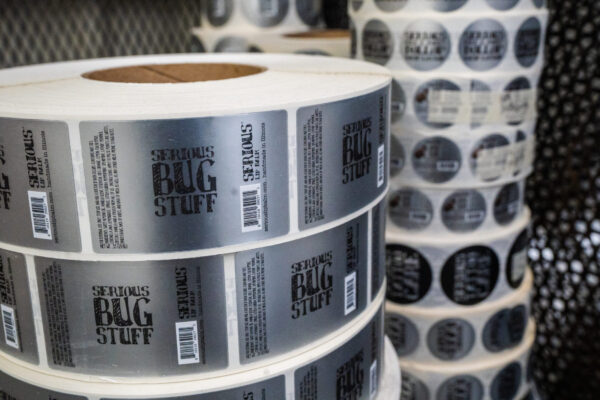The increased costs associated with tariffs impact all of us, affecting millions of people. Retailers of all kinds across Illinois import many of the goods they sell. Tariffs have created more uncertainty for retailers than many have ever experienced. The Illinois Retail Merchants Association has found that while retailers are trying to hold-off on price increases, it’s impossible to absorb the extra expenses for numerous business owners who function on very small margins – which forces consumers to pay more.
Retailers like Khara Koffel and Megan Lucky, co-owners of Serious Lip Balm in Jacksonville, enrich our economy and strengthen our communities, even during the uncertainty of increased tariff expenses. To better understand how Serious Lip Balm is dealing with the escalation of existing tariffs, we sat down for a conversation with Khara and Megan.
Inside Serious Lip Balm in Jacksonville, many of their products come with unconventional and even funny names. For example, you can order the Munchies Lip Balm Bundle, or Serious Boop Balm, or how about a Betty White lip balm. But the playful, if not irreverent, use of English belies a very serious commitment to the care of body and soul.
Serious Lip Balm sells a wide variety of lip balms, lotions, and hand creams directly to customers on the internet and as a wholesaler to retail stores nationwide. They even carry products for dogs. What started out with the creation of a homemade teacher’s gift at a day care center in 2014 has evolved into a thriving enterprise co-owned by Khara Koffel and Megan Lucky.
“We always like to tell everybody that we have no business running a business,” said Khara with a sassy laugh. “But here we are! We’re quite the yin and yang.”
We opted to spend time at Serious Lip Balm, our first wholesaler in this series of interviews, to get a different perspective about how tariffs are impacting retailers across Illinois. According to Khara, Serious Lip Balm strives to use American materials, but that some essential butters and waxes for their all-natural products must be imported due to climate restrictions. In addition, tariffs have impacted the cost of their handcrafted wooden displays that they provide to retailers that sell Serious Lip Balm nationwide. The displays are sourced from a small business in South Carolina whose wood originates in China, forcing price changes and supply challenges. Khara and Megan now find themselves in a difficult position, deciding how to keep prices for their product affordable in the middle of a tariff war that is beyond their control.
IRMA: How are you seeing the impact of tariffs on your business?
KHARA: Serious Lip Balm is seeing the impact of tariffs on our business all around. In some cases, we’re having problems getting certain supplies. We work with an incredible small business out of South Carolina that handcrafts all of our displays, and those displays are made from wood that they have to have created and modified in a specific way. It all comes from China, and those tariffs have affected them to such a degree that their prices have had to all be changed. The amount of time that they’re having to spend finding new suppliers has been really taking a toll.
IRMA: So how are you coping with that situation?
KHARA: We are lucky enough to be in a position where we can be flexible with the people from whom we get our displays and some of our supplies, because we want to stick with them. We want to support other businesses in Illinois and around the country, so at this point, we’re able to stick with them. But who knows if these businesses are even going to be able to survive. That’s a scary place to be.
IRMA: Where do you buy your raw materials?
KHARA: We buy all American materials here. We buy from companies in Ohio and from companies in Colorado. We source things from all over the place within the US. That being said, I don’t know specifically where they’re getting all of their materials. Frankly, some of the materials can’t be manufactured in the United States. There are certain butters and waxes that we use to make our all-natural products that can’t grow in climates like this. We know that they’re being imported, and that’s just part of who we are.
IRMA: As a wholesaler for some products, who works with retailers, how have you seen the tariff impact your retailers?
KHARA: As a wholesaler who works with retailers hand in hand, I have been shocked to hear stories of how long people are actually going to be able to stay in business if the tariff uncertainty continues. We’ve already had friends that have had to close their doors as retailers. They couldn’t afford to buy the products that were coming into their stores, because it just so happened that they needed to restock at the time when the tariffs were incredibly high. Those products were coming from China and overseas. They couldn’t afford the products that they had ordered months in advance to be able to receive them, and turn them around to sell in their stores. That’s a sad tale. It’s a really sad situation.
IRMA: What is your biggest concern about this global tariff war?
KHARA: One of the biggest problems with tariffs that we’re finding is that there is so much uncertainty. With tariff rates going up and down, everybody keeps believing that perhaps they’ll go away. Perhaps things will change. But unfortunately, that’s not changing the environment right now, that we need to be able to sustain this business and the businesses of our friends.
IRMA: If you had a crystal ball, what do you see in the future as far as tariff rates?
KHARA: For us, the long-term impact of the tariffs is really going to be in what we’re able to create and what we’re able to offer our retailers and at what scale, because we can only afford so much of a margin with our products, and we want our products to be accessible to everyone. We don’t want to make a super high-end product that can’t be affordable to anyone.
So, this is really going to affect us in the long term. Whether or not we need to change the way that we view our business is petrifying to me. Dealing with the tariffs and things that are out of my control. I do my best, and I know Lucky would agree with me. We do our best to create amazing products at affordable prices, and it’s scary to know that as hard as we work and as much as we do, there are so many things that are out of our control and that we have no handle on whatsoever.
IRMA: Can you adjust the way you do business in the shadow of all this uncertainty?
KHARA: As a business, we’ve adapted to the tariffs for right now. We are looking at different avenues for our products that might not have been open to us in the past. We are looking at areas like corporate gifting and things that were traditionally imported before. We are attempting to be flexible and to move into that market a little bit more, just because if there are voids in other areas that have been created by rising tariff rates, we have to sort of see what we can do and be flexible with the business and move into them.
IRMA: What do you want politicians to know when it comes to small business and the global tariff wars?
KHARA: We are a small business in Jacksonville, and we are affected by the tariffs. Sure, we can buy everything from American businesses, but at the end of the day, we don’t know where all of those supplies are coming from. So, it’s tricky because tariffs affect everyone.
IRMA: What does this all mean for customers and you?
KHARA: The retail system right now is really being shaken to the core, because consumer confidence is just not there. People are afraid of every dollar that they spend and they’re really looking out for it. And because of that, it really trickles down to all businesses. You have retailers that don’t have as many consumers coming in to buy. Then, there are those retailers that aren’t able to really have confidence in buying more products to put into their stores. So, everything is really on hold. Plus, right now we’re preparing for the holidays and it really puts us in a difficult position all across retail and wholesale, because we really don’t know where things are going, and we don’t know where to put our resources. We don’t know who is going to be buying. We don’t know if the customers are going to be there. You can make the best product in the world, but if people are afraid to spend their money, I’m not going to be able to make it.
To learn more about Serious Lip Balm visit www.seriouslipbalm.com.
